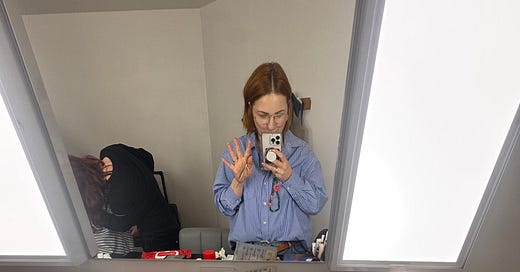Burnout & Boundaries: The Real Talk About Saying No and Actually Surviving This Industry
Why protecting your energy is the most professional move you can make.
There’s a moment that hits mid-season—usually on your fifth 5 a.m. call time or 16hr day, living off coffee and sugar, halfway through a face—that you realise you’re not creating anymore. You’re just executing. You’re ticking boxes. You're smiling, you're booked… but you're not there…….you’re just livid about the alternative milk situation on set.
And here’s the truth no one says out loud:
Burnout doesn’t show up as a dramatic collapse. It looks like you, doing great work—and feeling absolutely nothing about it.
This industry won’t protect your energy. No one’s coming to rescue you from overextending, overdelivering, and under-recovering. You have to learn to do that for yourself.
Stop Saying Yes to Everything
At the start of your career, you say yes to everything. You should. You need the experience, the contacts, the receipts. But if you’re years in and still saying yes to everything—bad rates, chaotic sets, impossible turnarounds—you’re not building a career. You’re just surviving one.
Every “yes” has a cost. Sometimes it’s your back. Sometimes it’s your sleep. Sometimes it’s your joy.
Saying no doesn’t make you difficult.
It makes you strategic.
What Burnout Really Looks Like
Let’s call it out. Burnout isn’t always dramatic. Most of the time it’s quiet. It’s functional. And it’s corrosive as all hell.
You stop prepping properly. You're just winging it or carrying around a giant kit but using the same small edit over and over
You stop caring. You’re still showing up, but mentally? Checked out.
You stop saying no—even when everything in your gut says “don’t do this.”
You stop feeling proud. The work is fine, but you’ve gone numb.
That’s not a bad week. That’s depletion.
When Everyone’s Fried, How Do You Still Connect?
We’ve all been on those jobs: the client’s stretched, the team’s on their third week of nonstop shoots, no one’s made eye contact all day, everyone stays isolated in their teams. It’s polite. It’s professional. It’s dead inside.
Here’s how to stay human when the room isn’t:
Stay grounded. Prep properly or if you cant, at least be calm. Be a grown-up. It helps more than you think.
Don’t force it. You don’t need to be Miss Universe. A quiet hi, or offering a someone a snack goes further than forced small talk.
Protect your energy—but don’t isolate. You can stay connected without draining yourself.
Sometimes, just being composed, clean, and kind is enough to shift a set.
When the Job Is Too Good to Refuse
There are times when the job is a non-negotiable yes:
It’s a dream client, a top photographer, the rate’s great—or it’s just a pivotal moment for you.
If you’re burned out but need to take it:
Prep like hell the day before. Rest, eat well, go in focused or if none of that is achievable, play some joyful music or focus on your breathing on the way to the job to bring you back to yourself.
Deliver, but don’t overspend your energy. Show up, do the job as best you can, don’t linger.
Book recovery time after. I mean it. Even if it’s just one full day offline, a solo middle of the day cinema date or a hard workout, whatever gets you out of your busy mind.
If you’ve got an agent—loop them in. Let them help you set terms. If you’re repping yourself, don’t be afraid to negotiate or to ask for what you need. People respect clarity.
Saying No Is Career Maintenance
Look—saying no isn’t a luxury. It’s business maintenance. If you’re always available, always agreeable, always saying yes, people stop valuing your time. Fast.
Here’s what saying no actually does:
Makes room for the right jobs
Keeps you from overdelivering on underpaying gigs
Protects your reputation—you’re not showing up fried
Reminds clients you have standards (and they should too)
You don’t have to justify it. “I’m unavailable” is enough.
How to Know When It’s a No
If you’re not sure whether to take a job—or you’re scared to say no because of FOMO or people-pleasing—ask yourself:
Am I physically and mentally able to show up as my best self?
Is the rate fair for the time, location, and brand?
Will this job serve my long-term goals, portfolio, or relationships?
Have I had a break recently—or is this just busy for busy’s sake?
Do I actually want to do this—or am I afraid not to?
If you can’t say yes to at least three of those? That’s your cue.
Learning to assess work through this kind of lens is how you shift from hustle mode to career mode. This is what sustainability looks like.
Longevity = Boundaries
Your artistry might get you in the room, but your boundaries keep you in the industry.
You don’t need to be a robot. You don’t need to say yes to prove you’re grateful.
You need to take care of the version of you that still loves this job.
This is a long game.
Say no when it protects your joy.
Say yes when it fuels your future.
And if everyone else is manic, be the calm one. That’s power too.
At the core of it all is self-respect. Not the performative kind, but the quiet, grounded belief that your time, your energy, and your talent are valuable—and not up for grabs. This industry will always ask for more and take everything that is offered. It’s your job to protect the part of you that creates, that connects and still cares. You can’t build longevity on exhaustion. You build it by knowing your worth, honouring your limits, and making choices that serve both your artistry and your wellbeing. Not every job deserves you. And the moment you start acting like that’s true, everything shifts.




